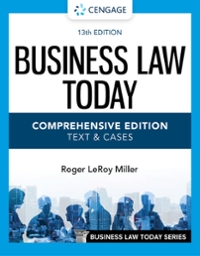Guy Holcomb owns and operates Oasis Goodtime Emporium, an adult entertainment establishment. Holcomb wanted to create an
Question:
Guy Holcomb owns and operates Oasis Goodtime Emporium, an adult entertainment establishment.
Holcomb wanted to create an adult Internet system for Oasis that would offer customers adult theme videos and live chat room programs using performers at the club. On May 10, Holcomb signed a work order authorizing Thomas Consulting Group (TCG) “to deliver a working prototype of a customer chat system, demonstrating the integration of live video and chatting in a Web browser.” In exchange for creating the prototype, Holcomb agreed to pay TCG $64,697. On May 20, Holcomb signed an additional work order in the amount of $12,943 for TCG to install a customized firewall system. The work orders stated that Holcomb would make monthly installment payments to TCG, and both parties expected the work would be finished by September.
Due to unforeseen problems largely attributable to system configuration and software incompatibility, the project required more time than anticipated. By the end of the summer, the website was still not ready, and Holcomb had fallen behind in the payments to TCG. TCG was threatening to cease work and file suit for breach of contract unless the bill was paid. Rather than make further payments, Holcomb wanted to abandon the website project. Using the information presented in the chapter, answer the following questions.
1. Would a court be likely to decide that the transaction between Holcomb and TCG was covered by the Uniform Commercial Code (UCC)? Why or why not?
2. Would a court be likely to consider Holcomb a merchant under the UCC? Why or why not?
3. Did the parties have a valid contract under the UCC? Explain.
4. Suppose that Holcomb and TCG meet in October in an attempt to resolve their problems. At that time, the parties reach an oral agreement that TCG will continue to work without demanding full payment of the past-due amounts and Holcomb will pay TCG $5,000 per week. Assuming that the contract falls under the UCC, is the oral agreement enforceable? Why or why not?
Step by Step Answer:






